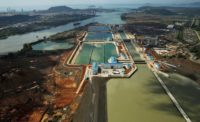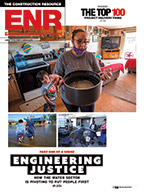
With so many different nationalities and cultures represented among its participants, the Panama Canal expansion project faces obstacles worthy of the U.N. General Assembly. Together with the canal's vital role in world shipping and to the Panamanian economy—and with the project's construction risks—it's not hard to understand how misunderstandings could have led to $1.6-billion in disputed claims, said project risk experts speaking at ENR's Global Construction Summit in New York City on May 13.
Jerry P. Brodsky, director of the Latin American practice group for law firm Peckar & Abramson, said the problems created by such multinational casts would be more common in building complex infrastructure projects, but cultural issues that add to the canal's complexity and resolution challenges have not been adequately addressed.
"There are millions of dollars spent by the construction industry on cost- optimizing and on value engineering, but I haven't heard or seen any effort by the industry to spend money in dealing with language and culture issues and business practices that come together on a project like this," he said.
Peckar & Abramson represents Zurich, the Switzerland-based surety for the canal project. It has agreed to make operating funds available to the contracting consortium, Grupo Unidos por el Canal, as part of an arrangement that restarted the project after the team stopped work in February.
Frank J. Giunta, Americas managing director for consultant Hill International Inc., a consultant to the owner, the Panama Canal Authority, said that it had set up dispute and claims procedures ahead of time, which helped keep work moving forward. He added that the authority's loans of working capital to the contractors also helped. "As it turned out, that became a key element in financing and keeping the project going," said Giunta.
In addition to financial and delay- related issues, technical troubles bedeviled the project, although he said these were not much different from ones on U.S projects. "That's one area where Jerry and I agree," he said.
Larry Walker, executive vice president of global strategy for consultant Berger Group Holdings, provided outside perspective on the project trouble. He said projects of all kinds were more complex, expectations from clients higher and customized contracts more common. Walker said he was not convinced that the canal disputes were unique, noting that good communication is the key to success.




Post a comment to this article
Report Abusive Comment